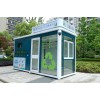发货:3天内
发送询价
2019年,北京将实现全市97%的行政村生活垃圾得到有效治理,完成全市162处非正规垃圾堆放点75%的治理任务。7月1日,《上海市生活垃圾管理条例》正式实施,根据规定,个人或单位未按规定分类投放垃圾都将面临处罚。与此同时,全国多地也陆续进入垃圾分类“强制时代”。
湿垃圾
湿垃圾是指,日常生活垃圾产生的容易腐烂的生物质废弃物
湿垃圾主要包括
食材废料、剩饭剩菜、过期食品、蔬菜水果、瓜皮果核、花卉绿植、中*残渣等
湿垃圾投放要求
1. 纯流质的食物垃圾,如牛奶等,应直接倒进下水口
2. 有包装物的湿垃圾应将包装物去除后分类投放,包装物请投放到对应的可*物或干垃圾容器


In 2019, Beijing will realize 97% of the city's administrative villages' domestic garbage to be effectively treated, and complete 75% of the 162 infor*l garbage dumping points in the city. On July 1, the "Regulations on the *nagement of Domestic Waste in Shanghai" was officially implemented. According to the regulations, individuals or units that fail to deliver garbage according to the regulations will face penalties. At the same time, *ny places across the country h*e also entered the “enforcement era” of garbage classification.
Wet garbage
Wet rubbish refers to perishable bio*ss waste produced by household garbage.
Wet garbage *inly includes
Ingre*nts waste, leftovers leftovers, expired foods, vegetables and fruits, melon nucleus, flower green plants, Chinese medicine residues, etc.
Wet garbage placement requirements
1. Pure liquid food waste, such as milk, should be poured directly into the drain
2. Wet garbage with packaging *terials should be sorted after the packaging *terials are removed, and the packaging *terials should be placed in the corresponding recyclables or dry garbage containers.
